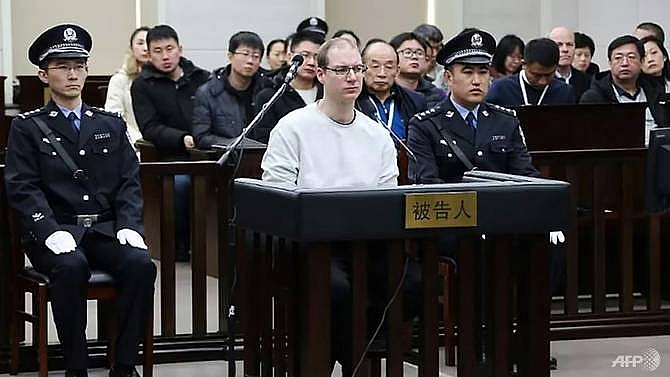Canada asks China clemency for convicted drug trafficker
 |
| Canadian Robert Lloyd Schellenberg (C) is pictured during the retrial at which he was sentenced to death for drug trafficking AFP/HANDOUT |
Ottawa has warned its citizens about the risk of "arbitrary enforcement" of laws in China following a court's sentencing of Robert Lloyd Schellenberg, 36, to death on Monday, increasing a previous 15-year prison term.
The sentence came during a clash between Ottawa and Beijing over Canada's arrest in December of Meng Wanzhou, chief financial officer of telecom giant Huawei, on a US extradition request related to Iran sanctions violations.
"We have already spoken with China's ambassador to Canada and requested clemency" for Schellenberg, Canada's Foreign Minister Chrystia Freeland told reporters in Sainte-Hyacinthe, Quebec.
Earlier, Beijing said Prime Minister Justin Trudeau had made "irresponsible remarks" for saying China chose to "arbitrarily apply" death penalties.
Freeland recalled Canada's long-standing opposition to capital punishment.
"We believe it is inhumane and inappropriate, and wherever the death penalty is considered with regard to a Canadian we speak out against it," she said.
In a move observers see as retaliation over the Huawei case, Chinese authorities detained two other Canadian citizens - a former diplomat and a business consultant - on suspicion of endangering national security.
The timing and swiftness of Schellenberg's sentence, and the inclusion of new evidence, raised suspicion among observers.
Human Rights Watch executive director Kenneth Roth said China was "playing hostage politics."
In response to Canada's travel advisory on China, Beijing issued a similar response, urging its nationals to "travel cautiously."
China executes one or two foreigners every year - nearly all for drug offences, according to John Kamm, director of the US-based Dui Hua Foundation rights group.
What the stars mean:
★ Poor ★ ★ Promising ★★★ Good ★★★★ Very good ★★★★★ Exceptional
Related Contents
Latest News
More News
- Russian President congratulates Vietnamese Party leader during phone talks (January 25, 2026 | 09:58)
- Worldwide congratulations underscore confidence in Vietnam’s 14th Party Congress (January 23, 2026 | 09:02)
- Political parties, organisations, int’l friends send congratulations to 14th National Party Congress (January 22, 2026 | 09:33)
- 14th National Party Congress: Japanese media highlight Vietnam’s growth targets (January 21, 2026 | 09:46)
- 14th National Party Congress: Driving force for Vietnam to continue renewal, innovation, breakthroughs (January 21, 2026 | 09:42)
- Vietnam remains spiritual support for progressive forces: Colombian party leader (January 21, 2026 | 08:00)
- Int'l media provides large coverage of 14th National Party Congress's first working day (January 20, 2026 | 09:09)
- Vietnamese firms win top honours at ASEAN Digital Awards (January 16, 2026 | 16:45)
- ASEAN Digital Ministers' Meeting opens in Hanoi (January 15, 2026 | 15:33)
- ASEAN economies move up the global chip value chain (December 09, 2025 | 13:32)

 Tag:
Tag:



















 Mobile Version
Mobile Version